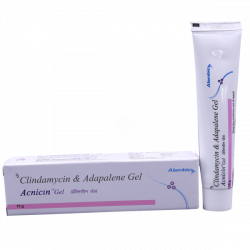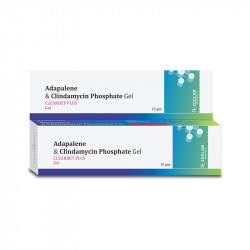Download India's most affordable pharmacy app
- Compare with medicine prices
- Save upto 90% on your medicine bills
COMPOSITION:
Adapalene (0.1% w/w) + Clindamycin (1% w/w)DESCRIPTION:
Acnicin Gel contains Adapalene (0.1% w/w) + Clindamycin (1% w/w) and is prescribed for the treatment of acne (pimples, blackheads, whiteheads) and related skin conditions. It belongs to the class of medicines called retinoids (Adapalene) and antibiotics (Clindamycin). This combination works by targeting multiple causes of acne—blocked pores, bacterial growth, inflammation, and abnormal skin cell turnover. Acnicin Gel helps to reduce pimples, prevent new breakouts, clear blackheads/whiteheads, and promote healthier skin renewal.
Not everyone using Acnicin Gel will experience side effects, but some may notice mild skin irritation, redness, dryness, burning, peeling, or itching, especially during the first few weeks of treatment. These effects are usually temporary and improve as the skin adjusts. If symptoms persist or become severe, medical attention is advised. The medicine should be applied exactly as prescribed by a physician, usually once daily in the evening, after cleansing the skin.
Avoid Acnicin Gel if allergic to Adapalene, Clindamycin, or any of its ingredients. Patients with eczema, sunburn, or very sensitive skin should inform their doctor before use. Pregnant and breastfeeding women must seek medical advice before starting treatment. The gel is for external use only and should not be applied inside the mouth, eyes, or on broken skin.
Uses of Acnicin Gel
Acne Treatment: Acnicin Gel is highly effective in managing mild to moderate acne. Adapalene controls abnormal skin cell turnover and unclogs pores, while Clindamycin reduces bacterial growth and inflammation. Together, they work to reduce the number and severity of acne lesions, leading to clearer skin.
Prevents New Acne Formation: Adapalene keeps pores open and prevents blockage by dead skin cells. Clindamycin stops acne-causing bacteria (Propionibacterium acnes) from multiplying. This combination ensures long-term acne control rather than temporary relief.
Reduces Inflammation: Clindamycin has antibacterial and anti-inflammatory properties, which calm irritated skin and reduce swelling and redness. This speeds up healing and lowers the risk of acne scarring.
Improves Skin Texture: Adapalene promotes skin renewal by encouraging new, healthy cell growth. Over time, this leads to smoother skin, reduced roughness, and an even skin tone.
Supportive Therapy: Acnicin Gel is often prescribed in combination with other acne treatments like benzoyl peroxide or oral antibiotics. This enhances treatment outcomes by addressing multiple acne-causing factors.
Benefits of Acnicin Gel
- Clears pimples, blackheads, and whiteheads effectively.
- Prevents new acne breakouts by unclogging pores and controlling bacteria.
- Reduces inflammation, redness, and swelling.
- Improves skin texture and overall appearance.
- Provides long-term acne management with consistent use.
- Works well in combination with other topical acne medicines.
How Acnicin Gel Works
- Adapalene (0.1% w/w): A retinoid that normalises skin cell turnover, prevents clogged pores, reduces inflammation, and promotes healthy skin renewal.
- Clindamycin (1% w/w): An antibiotic that inhibits bacterial growth (Propionibacterium acnes), reducing infection, swelling, and redness.
Together, they target both the bacterial and non-bacterial causes of acne, making the treatment more effective.
How to Use Acnicin Gel
- Use Acnicin Gel exactly as prescribed by your doctor.
- Apply a thin layer to the affected skin once daily, preferably in the evening.
- Wash and dry your skin before application.
- Avoid applying on broken, sunburned, or sensitive skin.
- Do not use excessive amounts, as this may increase irritation without improving results.
- Use sunscreen during the day, as skin may become more sensitive to sunlight.
Side Effects of Acnicin Gel
Common side effects: Redness, dryness, peeling, mild burning, itching, or irritation during the first few weeks.
Serious side effects: Severe allergic reaction, persistent swelling, blistering, severe diarrhea (rare but possible with Clindamycin). Seek immediate medical advice if serious side effects occur.
Safety Advise
- Alcohol – No direct interaction, but avoid alcohol-based skincare products as they may worsen irritation.
- Pregnancy – Not recommended during pregnancy. Consult your doctor.
- Breastfeeding – Use with caution. Avoid applying near the breast area.
- Driving – No effect on driving ability.
- Kidney – Safe, as it is topical and minimally absorbed.
- Liver – Safe for use; very limited systemic absorption.
Frequently Asked Questions
Q: How long does it take for Acnicin Gel to work?
A: It may take 8–12 weeks of consistent use to see significant improvement. Some patients may notice temporary worsening of acne before results appear.
Q: Can Acnicin Gel cure acne permanently?
A: No, it does not cure acne permanently but provides long-term control and prevention of new breakouts with regular use.
Q: Can I use Acnicin Gel with other acne medicines?
A: Yes, it can be combined with benzoyl peroxide or oral antibiotics, but only under medical supervision.
Q: Should I apply Acnicin Gel in the morning or evening?
A: It is usually applied once daily in the evening, as sunlight may reduce its effectiveness and increase sensitivity.
Q: Can Acnicin Gel make acne worse initially?
A: Yes, some patients may notice temporary worsening (purging), but this improves with continued use.
Q: Is Acnicin Gel safe for long-term use?
A: Yes, it is generally safe for long-term use under medical guidance.
Q: Can I apply moisturizer with Acnicin Gel?
A: Yes, a non-comedogenic moisturizer can reduce dryness and irritation.
Q: Is Acnicin Gel suitable for sensitive skin?
A: It may irritate sensitive skin. Doctors often recommend starting with alternate-day use.
Q: Can I use makeup over Acnicin Gel?
A: Yes, but only non-comedogenic and oil-free products should be used.
Q: Can Acnicin Gel be used during pregnancy or breastfeeding?
A: It should be avoided during pregnancy. During breastfeeding, use only if prescribed, and avoid application near the breast area.









 Added!
Added!